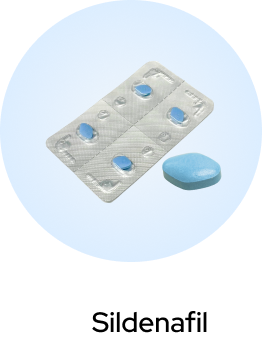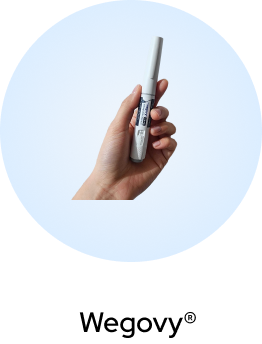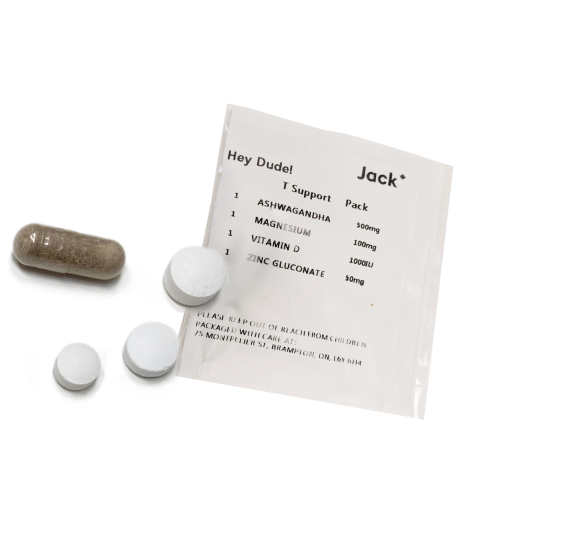Viagra (active ingredient Sildenafil) is one of the most well-known and popular treatments for erectile dysfunction (ED). Since its introduction in 1998, Viagra has helped millions of men improve their sexual performance and confidence.
But like with any medication, the often-called “little blue pill” comes with potential side effects and risks. Knowing how this medication interacts with your body can help you use it safely and get the best results.
This article covers everything you need to know about this treatment, whether you’re a first-time user or looking for a refresher. We will guide you through all Viagra side effects and possible risks and will share essential tips for safe usage.
How Viagra Works
Viagra (Sildenafil) works by inhibiting PDE5 (Phosphodiesterase-5), an enzyme in the walls of the blood vessels. This enzyme can restrict blood flow to the penis. The active ingredient in Viagra, Sildenafil, inhibits the PDE5 enzyme to prevent it from working. This inhibition relaxes the muscles in the penis and increases blood flow, making it easier to get and stay erect.
Typically, Viagra starts to work within 30 to 60 minutes after taking it and has a window of action of around 4 hours. But it may take longer if you have recently eaten a heavy meal.
Common Side Effects of Viagra
Viagra is generally safe when used as directed. But like any FDA-approved medication, it can come with some side effects. According to a study published in Urology, side effects occur in 10-30% of users and are relatively mild and short-lasting.
The most common side effects include:
- Headache – Caused by increased blood flow and temporary changes in blood pressure.
- Flushing (redness in the face, neck, or chest) – A result of blood vessel dilation.
- Nasal congestion – Due to the drug’s effect on blood vessels in the nasal passages.
- Dizziness or lightheadedness – Linked to slight drops in blood pressure.
- Indigestion or upset stomach – Can occur as Viagra affects smooth muscle function.
These side effects typically occur as the body adapts to the medication. But if side effects persist or become bothersome, it’s best to consult your healthcare provider.
Serious Side Effects of Viagra
Serious side effects from Viagra are rare and usually tied to pre-existing conditions or medication interactions. According to a review of 67 controlled clinical trials, less than 1% of men experienced any serious issues.
Some of the dangerous but rare side effects include:
- Severe drop in blood pressure – more likely if taken with nitrates or certain medications, causing dizziness and headaches.
- Priapism – a prolonged erection lasting more than 4 hours, which can cause permanent damage if untreated.
- Sudden vision or hearing loss – extremely rare but has been reported to cause sudden vision loss. Possibly due to reduced blood flow to the optic or auditory nerve.
- Chest pain or irregular heartbeat – indicates a heart-related reaction and can worsen underlying heart conditions.
If you experience any of the side effects listed above, stop using Viagra and seek immediate medical attention. To reduce risks, always take Viagra as directed. More importantly, inform your doctor of the other medications you are on or any medical conditions that you have.
What are the Potential Long-Term Side Effects of Viagra?
For most men, long-term Viagra use is safe, and no, your body won’t become reliant on it to function. Data from a manufacturer-sponsored clinical trial showed no evidence of physical dependence or tolerance to Sildenafil, though 0.15% of users reported psychological dependence (often tied to confidence in achieving erections).
Reported areas of concern include:
- Heart health – since Viagra affects blood pressure, some studies suggest long-term use can increase the risks for men with pre-existing heart conditions. However, a comprehensive review published in the Journal of Sexual Medicine in 2014 found no significant increase in cardiovascular events among healthy men using Viagra.
- Vision changes – a condition that causes vision loss called non-arteritic anterior ischemic optic neuropathy (NAION) has been reported. But the risk is generally very low.
- Hearing issues – some studies have shown that Viagra may lead to temporary hearing loss though this is extremely rare.
If you have heart disease, high blood pressure, or other underlying conditions—talk to your doctor about the safest way to use Viagra based on your health history.
How Viagra Interacts with Different Bodily Systems
Viagra affects more than just erections as it also impacts other systems before exiting the body. Here’s where it can have an effect and what to watch out for.
- Circulatory System
Viagra helps improve blood flow to the penis, but it may affect blood pressure levels. This is usually harmless but can be risky for those with heart disease, low blood pressure, or those on nitrates.
- Reproductive System
Viagra improves erections but doesn’t increase desire or stamina in the bedroom. It also doesn’t affect sperm count or motility, though more research is needed on its long-term effects. - Central Nervous System
Since Viagra triggers changes in blood pressure and blood flow to the brain, it may cause dizziness and headaches. Rarely, it may lead to memory issues, mood changes, or seizures. Viagra should be discontinued if severe reactions occur, and inform your doctor immediately.
Who is at Higher Risk of Side Effects When Using Viagra?
While Viagra is safe for most men, some users do report minor side effects. This is why for certain groups, Viagra is recommended at prescribed dosages only. If you fall into any of the categories below, consult your doctor to determine the safest option for you.
High-Risk Group | Why They Should Be Cautious | |
Men with Heart Disease or High Blood Pressure | Since Viagra lowers blood pressure, it can be dangerous for men with pre-existing heart conditions or hypertension. Combining nitrates or blood pressure medications with Viagra can cause an extreme drop in blood pressure. This can lead to dizziness, fainting, or even a heart attack. | |
Those with Liver or Kidney Disease | Viagra is processed through the liver and excreted by the kidneys. This has potential risks for those with liver disease as it may take longer to clear the drug from their system. | |
Men Taking Certain Medications | Viagra interacts with many drugs, including: | |
Nitrates (for chest pain) | could lead to a dangerous or potentially fatal drop in blood pressure | |
Alpha-blockers (for high blood pressure or prostate issues) | may cause dangerously low blood pressure when taken with Viagra | |
Some antifungal and | can interfere with how Viagra is processed in the body | |
Older Adults (65+) | Viagra may stay in the system longer because the body metabolizes drugs more slowly as it ages. This prolonged result increases the risk of side effects and should be taken with caution in older adults. | |
Men with Eye Conditions | Men with a history of eye conditions like glaucoma have a higher risk of experiencing a rare side effect called NAION, which can lead to vision changes or sudden vision loss. | |
How to Minimize the Risk of Viagra Side Effects
Below are some practical steps you can take to help reduce the risk of Viagra side effects and ensure a safer and more comfortable experience for you.
- Follow the Prescribed Dosage
The simplest way to avoid side effects is to take Viagra exactly as directed by your doctor.
- Stay Hydrated
Make sure to drink plenty of water before and after taking Viagra to avoid dehydration, which can intensify dizziness and headaches.
- Avoid Alcohol
Viagra must not be combined with alcohol excessively. This can increase the risk of side effects like headaches and low blood pressure. Limit your alcohol intake when taking Viagra to prevent unwanted reactions.
- Skip Fatty Meals Before Taking Viagra
High-fat meals can delay the absorption of Viagra in the body, reducing its effectiveness. Take Viagra on an empty stomach or after a light meal for optimal results.
- Consult Your Doctor Regularly
Regular check-ups with your doctor are necessary, especially if you have any underlying health conditions or are taking other medications.
How to Manage Viagra Overdose
Taking more than the prescribed dose of Viagra can lead to severe drops in blood pressure. This will result in dangerous symptoms and complications, including:
- Severe dizziness or lightheadedness
- Nausea or vomiting
- Blurred vision or sudden vision loss
- Chest pain or irregular heartbeat
- Priapism (prolonged erection lasting more than 4 hours)
If you suspect an overdose, take these steps immediately:
- Call 911 or go to the emergency room right away if you experience any symptoms of overdose.
- Do Not Wait – If you have priapism (an erection lasting more than 4 hours), seek medical help immediately to prevent long-term damage.
- Inform the Medical Team – Tell healthcare providers exactly how much Viagra you’ve taken and when, as this will help them assess the situation and provide the best treatment.
Key Takeaways
- Viagra is an effective treatment for erectile dysfunction (ED) that works by improving blood flow to the penis—but no, it doesn’t affect sexual desire and stamina.
- High-risk groups, such as those with heart disease or taking certain medications, should take Viagra with more caution and as prescribed only by their doctor.
- While an overdose of Viagra is rare, it can be life-threatening and requires medical attention for severe side effects.
Frequently Asked Questions
➧ Can Viagra Affect Vision or Cause Blue-Tinted Vision?
Yes. Some users may experience blue-tinted vision or a blurred visual effect due to increased cGMP levels (a substance that dilates blood vessels), which can affect the retina. This is temporary and usually resolves within a few hours, but if you experience sudden vision loss, consult a doctor immediately.
➧ Does Viagra Cause Dependency or Tolerance Over Time?
No. Viagra does not cause physical dependency or tolerance—your body won’t require higher doses to achieve the same effect. However, some men may develop a psychological reliance on Viagra, mostly because they lose confidence in getting an erection without it.
➧ What Happens If You Take Viagra And Don’t Need It?
If you don’t have erectile dysfunction, taking Viagra is unlikely to cause any significant changes in your ability to get an erection. But it may increase the risk of side effects, such as headaches or dizziness. Do note that it doesn’t enhance sexual performance or increase libido.



















 (US)
(US)



